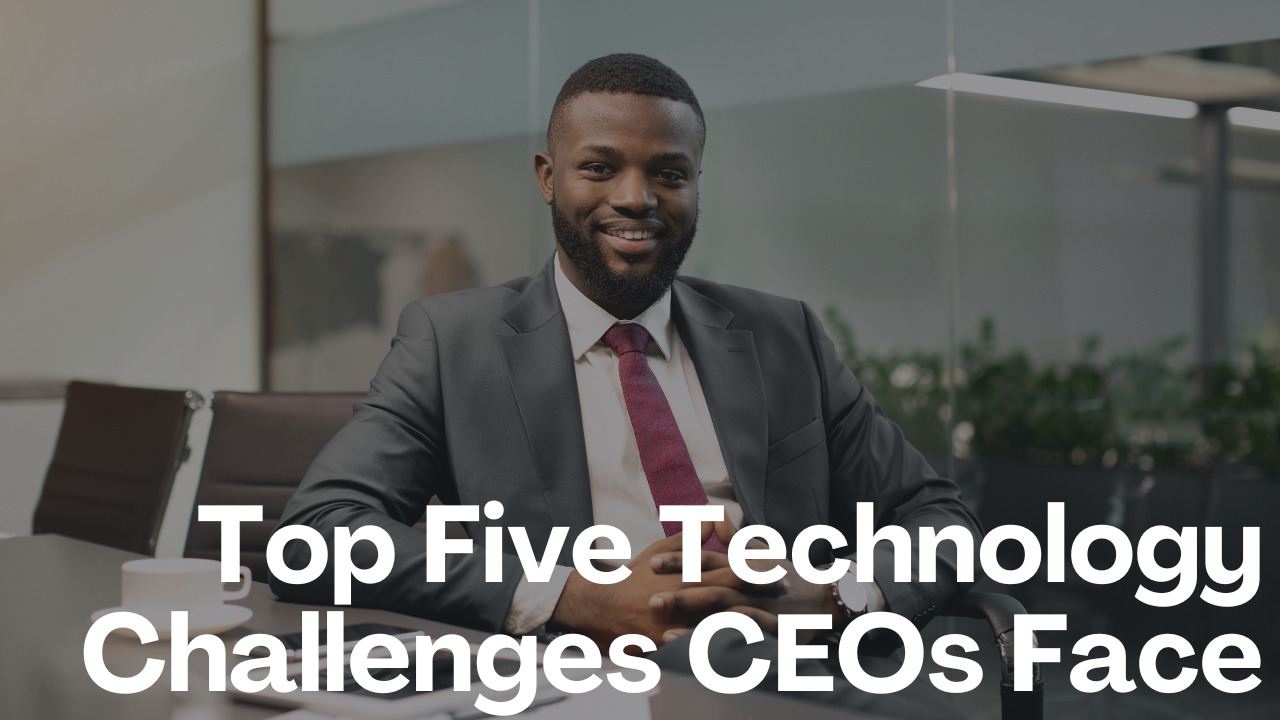The Top Five Technology Challenges CEOs Face Leading Up to 2024: Navigating Emerging Innovations and Risks
Emerging Technological Challenges for CEOs in 2024
With 2024 on the horizon, CEOs are preparing to navigate a landscape increasingly shaped by rapid technological advancements. Understanding these challenges is critical to ensuring their companies remain competitive and agile in the face of change. Below are five core technology-related issues that CEOs will likely need to address:
- Data Management and Protection: As the volume of data grows, leaders must focus on effectively managing and securing this valuable asset. Implementing advanced cybersecurity measures and ensuring compliance with data protection regulations will be essential.
Importance Strategy Data Privacy Privacy Policies Cybersecurity Security Frameworks - Integration of Artificial Intelligence (AI): AI is becoming central to business operations. CEOs must oversee the integration of AI systems in a way that enhances efficiency without displacing too many jobs, creating ethical complications, or causing significant disruption.
Key Consideration Implementation Focus Employee Upskilling Training Programs Ethical AI Usage Ethical Guidelines - Automation and the Workforce: The increase in automation can lead to significant productivity gains but also raises concerns about workforce displacement. CEOs must balance these advancements with workforce development and potential re-skilling initiatives.
Challenge Solution Balancing Automation & Labor Reskilling Programs - Supply Chain Digitalization: After recent global disruptions, optimizing the supply chain through digital means has become imperative. This involves adopting new technologies to enhance transparency and responsiveness to market changes.
Digital Solution Benefit Real-time Supply Chain Tracking Improved Response to Disruptions - Innovation and Investment: Staying ahead requires continuous innovation and smart investments in technology. Leaders must identify which technologies will drive future growth and allocate resources to harness these innovations effectively.
Investment Priority Expected Outcome Research and Development (R&D) Long-term Competitive Advantage
By identifying and preparing for these challenges, CEOs can position their companies to thrive in the dynamic tech environment of 2024.
Harnessing the Power of Intelligent Systems
In the advent of 2024, CEOs face the pressing challenge of integrating intelligent automation into their business operations. Intelligent automation—a synergetic combination of artificial intelligence (AI) and automated systems—not only enhances efficiency but also augments the capabilities of human personnel. Here’s a concise overview of the key aspects:
- AI-Driven Efficiency: AI systems can analyze large data sets more quickly and accurately than humans. They streamline operations and automate mundane tasks to improve overall productivity.
- Workforce Transformation: Adopting intelligent systems necessitates a shift in workforce skills. Employees must be trained to work alongside AI, focusing on enhancement rather than replacement.
- Decision Making: By leveraging AI for predictive analytics, businesses gain insights that drive more informed and strategic decision-making processes.
- Customer Experience: Intelligent automation tools can personalize customer interactions, accurately respond to inquiries, and adapt to consumer behaviors. This elevates the customer experience.
- Strategic Implementation:
Element Consideration Scalability Can the system grow with the business? Integration How well does it integrate with existing technology? Security Does it enhance or compromise data security? Investment Is there a clear ROI for automation technologies?
Business leaders must navigate these aspects, balancing the immediate costs with long-term benefits to remain competitive and innovative. By embracing intelligent automation, companies can reinvent their business models and improve operational effectiveness.

Safeguarding Data Integrity and Confidentiality
Organizations must prioritize the protection and confidentiality of their data. With the increasing reliance on digital infrastructure, this aspect of cybersecurity can no longer be an afterthought but a core operational objective. Leaders should establish clear security policies that articulate the need for robust measures to safeguard the organization’s data assets and ensure their integrity.
Key Strategies for Data Security and Privacy:
- Establish Strong Policies: Set comprehensive security protocols aligning with the company objectives and regulatory requirements.
- Regular Risk Assessments: Conduct ongoing evaluations of vulnerabilities within the organization’s network and systems.
- Employee Training: Implement routine training programs to educate employees on the importance of data privacy and their role in maintaining it.
- Invest in Technology: Allocate resources to acquire state-of-the-art security software and hardware capable of defending against evolving threats.
- Data Encryption: Use encryption methods to protect sensitive information at rest and in transit.
- Access Control: Define clear access permissions and employ authentication mechanisms to limit information access to authorized personnel only.
In the face of rapid data expansion, leaders must also be aware of the regulatory landscape governing data privacy to ensure compliance and to foster trust with stakeholders. As we move towards 2024, CEOs must remain vigilant and proactive, adapting to the dynamic digital environment to protect their organization from cyber threats.
Addressing the Ethics of Artificial Intelligence
In the ramp-up to 2024, CEOs are keenly aware of the impact artificial intelligence (AI) has on ethical considerations within their organizations. Key challenges they face involve:
- Bias and Fairness: AI systems must be developed to avoid discriminatory biases, ensuring equality across race, gender, and socio-economic lines.
- Strategies involve diversifying data sets and implementing objective fairness metrics.
- Privacy: The protection of individual data within AI solutions is paramount.
- Policies for data anonymization and secure data handling are central.
- Accountability: Establishing clear lines of responsibility for AI actions.
- Frameworks assigning accountability for decisions made by AI are crucial.
- Transparency: Making AI processes understandable to users and stakeholders.
- Development of explainable AI that provides insight into machine decision-making processes.
- Safety and Security: AI must be reliable and secure against manipulation.
- Continuous monitoring and the application of robust security protocols to ensure AI integrity.
These highlighted areas demand the attention and action of business leaders to ensure the ethical deployment of AI technologies.
Steering Through the Complexities of Tech Regulation
CEOs find that remaining compliant with regulatory requirements is a significant challenge in the rapidly evolving tech industry. As companies innovate and integrate new technologies, they must also stay ahead of regulations often struggling to keep pace with technological advances.
- Antitrust Concerns: CEOs must ensure their business practices align with laws designed to prevent anti-competitive behavior.
- Data Management: Safeguarding consumer data and adapting to varying privacy laws requires robust data governance.
- Consumer Privacy: With heightened awareness around personal data usage, transparency and consent are key factors.
- Content Moderation: Companies face the arduous task of managing online content while balancing free speech and regulatory mandates.
- Emerging Tech Policy: As new technologies such as AI emerge, CEOs must monitor and prepare for potential regulatory frameworks affecting their adoption.
Adaptation to Change: CEOS must cultivate an adaptive business model that quickly responds to new regulations.
Strategic Compliance: Establishing a strategy that seamlessly integrates compliance measures into the business operation is vital to avoid disruption.
Incorporating these considerations into their strategic planning positions leaders to navigate and influence future regulatory landscapes.
Leveraging Big Data and Analytical Capabilities
In the dynamic business landscape leading up to 2024, CEOs confront various technological challenges, central among which is the strategic utilization of big data and analytics. As data amasses at an unprecedented scale, leaders must ensure their organizations can transform this resource into actionable insights.
- Data Complexity and Volume: Companies grapple with vast amounts of data sourced from diverse streams. Overcoming this involves:
- Streamlining data aggregation processes
- Investing in scalable storage solutions
- Speed and Transparency: Real-time analysis is critical for maintaining a competitive edge, necessitating:
- Deployment of advanced analytics software
- Enhancement of organizational agility
- Data Accuracy: Decision-making is only as reliable as the data at hand. Efforts must be focused on:
- Implementing robust data verification methods
- Maintaining data integrity through rigorous quality control measures
- Cultural Shift to Data-Driven Decision Making: Transitioning from experience-based to data-led strategies is essential. Organizations must:
- Foster a culture that values data-driven insights
- Encourage continuous learning and adaptation
- Analytics Adoption Challenges: Embracing a sophisticated analytical approach requires:
- Comprehensive training programs
- A clear roadmap for integration of analytics into decision-making processes
By confronting these challenges head-on, leaders can harness the true potential of big data and analytics, thereby driving innovation, efficiency, and growth as they navigate the rapidly evolving technological landscape of 2024.








